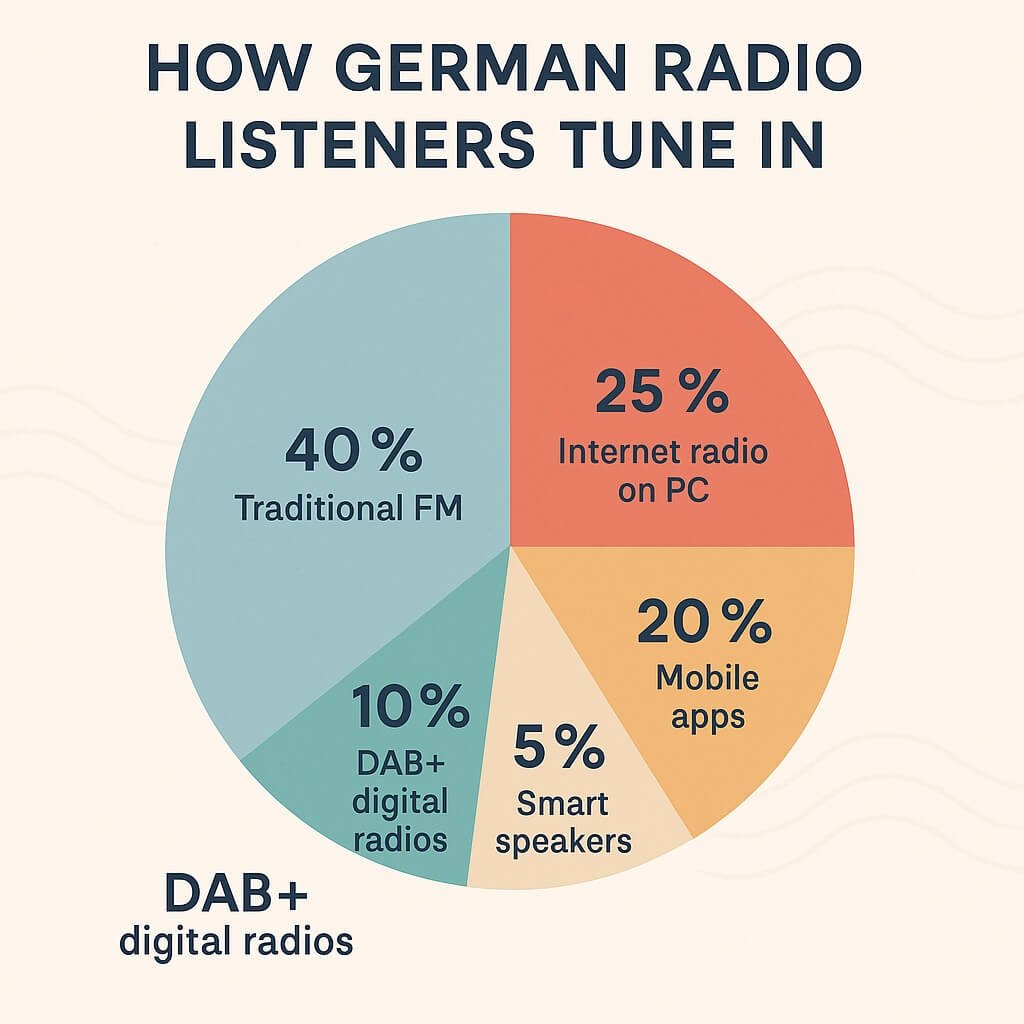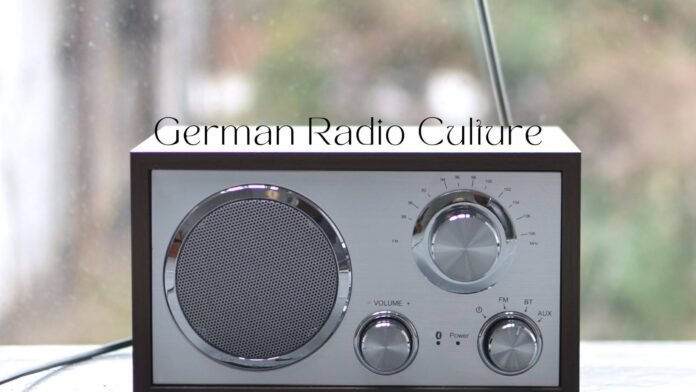What’s the one thing you wish you knew about German radio before tuning in?
Maybe you thought it was all classical music and weather reports. Or perhaps you’ve never given it a chance, assuming podcasts and streaming had taken over. But radio is still very much alive in Germany—and surprisingly diverse.
If you’re living abroad, learning German, or simply interested in German culture, radio can be more than just something to fill the silence. Many local stations showcase the unique flavors of different areas, along with music shows that mix various styles. Plus, there are programs designed to help you learn the language. There’s a rich and diverse world of radio waiting to be explored!
In this post, we’re tuning into the lesser-known corners of German radio. We’ll go beyond the basics and explore how it can inform your day, shape your taste in music, and even sharpen your Deutsch—helping you feel more connected to life here in Germany.
Ready to listen in?

“German radio isn’t outdated—it’s just waiting to be rediscovered.”
News You Can Hear: Local Voices and Global Perspectives
In a country as regionally diverse as Germany, national headlines only scratch the surface. Some of the most insightful reporting happens on the local airwaves.
Regional Radio – Where Germany’s Stories Begin
Germany’s public radio network is broken down by region, each state or area having its broadcaster. These stations cover local politics, social issues, and cultural debates that often don’t make it into national bulletins.
“Some of the most important stories in Germany start on local airwaves.”
Here are a few worth tuning into:
• BR24 (Bayerischer Rundfunk) – Based in Bavaria, this station offers in-depth reporting on regional politics and social change in southern Germany. Expect high-quality journalism with a distinctly Bavarian lens.
• rbb Inforadio (Rundfunk Berlin-Brandenburg) – An excellent pick for those in or interested in Berlin and the surrounding state of Brandenburg. It mixes urban news with national affairs, often featuring live reports from city council meetings, local protests, or cultural events.
• NDR Info (Norddeutscher Rundfunk)—Serving northern Germany, this station offers thoughtful reporting on issues affecting Hamburg, Lower Saxony, and beyond. Its coverage of climate and economic topics is robust.
• SWR Aktuell (Südwestrundfunk) – Focused on Baden-Württemberg and Rhineland-Palatinate, this station covers everything from automotive industry updates to local education reforms.
These regional stations offer more than just weather and traffic—they reflect the heartbeats of their communities.
English-Language News Options
If your German is still warming up, don’t worry—there are English-language broadcasts to help you stay informed.
• Deutsche Welle (DW News Radio) – Germany’s international broadcaster offers news in English (and many other languages). It’s a solid source for understanding how Germany sees itself—and the world.
• Radio Germany One – Based in Berlin, this online station caters to English-speaking expats. It blends pop music with hourly news updates and interviews on German life, culture, and politics.
• KCRW Berlin (archive) – Though it ceased live broadcasts, the station’s archived programs and podcasts offer valuable insights into Berlin’s cultural and political life in English.
Why Regional Radio Matters
Understanding Germany means understanding its regions. Listening to local news helps you grasp what people care about in different corners of the country—from rural energy debates in Bavaria to housing protests in Berlin.
Do you have a favorite station from your region? Or looking for news from a specific city? Drop your suggestions—or questions—in the comments below!
Here’s the third section of your blog, celebrating the hidden gems of Germany’s radio music scene:
Beyond the Charts: Discovering Germany’s Music on the Airwaves
Think German music is all techno and Oktoberfest anthems? Think again.
Germany’s radio scene is packed with stations that celebrate musical subcultures, local traditions, and sounds that rarely make international playlists. Whether you’re into yodels, synths, or soft indie ballads, there’s a frequency waiting for you.
Folk & Traditional Sounds
Want to feel like you’re in a mountain hut with an accordion playing in the background? These stations serve up authentic German folk music, often tied to regional heritage:
• BR Heimat (Bavarian Radio) – Broadcasting from Munich, this is your go-to for Bavarian folk, polka, and dialect-rich stories. It’s not just music—it’s a cultural immersion.
• HR4 (Hessischer Rundfunk) – A mix of German Schlager, classic hits, and Hessian charm. Ideal for those curious about the lighter, sing-along side of German tradition.
Indie & Alternative
For something modern, emotional, and a little offbeat:

• ByteFM—Based in Hamburg, ByteFM is a nonprofit station run by music lovers. Expect deep dives into indie, art-pop, underground electronica, and everything. Many shows are DJ-curated, with commentary in German but lots of international music.
• FluxFM is Berlin’s alt-cool staple. It is excellent for discovering emerging German and international artists in indie, electro-pop, and post-rock. It also hosts interviews and cultural segments tied to the Berlin creative scene.
Vintage Vibes & Schlager Nostalgia
Love a bit of kitsch? Or maybe you’re just curious about what your German neighbors listened to in the ‘60s and ‘70s:
• Radio Paloma – All about Schlager—Germany’s answer to golden oldies with bigger hair and catchier choruses. It’s joyful, strange, and 100% committed to the mood.
• Schlagerparadies—More mellow than Paloma, this station blends old and new Schlager hits, perfect for easy listening on a Sunday morning or while learning the curious charm of German pop lyrics.
Electronic & Experimental
Berlin isn’t the only place doing interesting things with beats and synths:
• Radio Blau (Leipzig) – A community station that features everything from avant-garde electronica to spoken word and leftfield club sets. Often hyper-local, always surprising.
• Radio X (Frankfurt) – Celebrated for its experimental programming, this indie station offers late-night DJ sets, underground techno, and genre-bending mixes.
Poll time!
Results
#1. Which genre are you most excited to explore?
Select all that apply:
Vote below or share your favorite hidden gem of a station in the comments—we’d love to hear what you’ve found!
Here’s your fourth section, designed to help readers turn German radio into a language-learning tool they’ll enjoy using:
Learn on the Go: Using German Radio to Boost Your Language Skills
“Radio teaches you what textbooks can’t: how Germans really speak.”
Think of German radio as your free, real-world classroom—no textbook required.
Whether you’re just getting started or looking to move beyond the basics, radio can sharpen your ears, expand your vocabulary, and introduce the rhythms of real-life conversation. The best part? You can do it while cooking, commuting, or relaxing at home.
Smart Listening Tips for Language Learners
Here’s how to get more out of every minute you tune in:
• Start small with short news bulletins – Focus on 3- to 5-minute segments from stations like Deutschlandfunk Nova or Tagesschau in 100 Sekunden. Repeat them a few times, and jot down new words.
• Pair audio with transcripts: Deutsche Welle’s Langsam gesprochene Nachrichten (Slowly Spoken News) offers daily broadcasts plus written text. It is perfect for learners at A2–B2 levels.
• Use music to learn slang and pronunciation. Try listening to pop or indie stations like FluxFM or Radio Fritz. Pick a catchy song, look up the lyrics, and sing along. It’s fun—and sneaky grammar practice.
• Set a “radio notebook” goal – Write down 5–10 new words or phrases you hear each day. Review them at the end of the week.
Stations and Programs Tailored for Learners
• Deutsch – warum nicht? (Deutsche Welle) – A classic audio series for beginners and intermediates, complete with transcripts and exercises.
• Slow German with Annik Rubens – This podcast-style program clearly explains German culture and language at a slower pace. It’s like chatting with a patient’s local friend.
• B5 aktuell’s “Sprachmagazin” – A Bavarian-based show focusing on German word origins, idioms, and linguistic trends.
• Radio D – Another Deutsche Welle gem, this drama series blends language lessons with an entertaining storyline—great for beginner to intermediate learners.

A Simple Daily Routine
- Morning – 5–10 minutes of slow news (e.g., Langsam gesprochene Nachrichten)
- Afternoon break: Listen to a song or culture podcast and write down new words
- Evening – Replay one segment or episode with the transcript, repeating key phrases aloud
Stick to this for 15 minutes daily, and you’ll be surprised by how quickly your listening improves.
Try one tip this week. How did it go? Or maybe you’ve already got a favorite radio show or podcast that helped you learn. Please share it in the comments so others can tune in too!
Ready to Tune In?
“One station. One day. That’s all it takes to start hearing Germany differently.”
German radio isn’t just background noise—it’s a gateway into the country’s culture, creativity, and everyday life.
You’ve now got the tools to go beyond the usual. Local news stations can help you understand the honest conversations in Berlin, Bavaria, or Bremen. Niche music stations let you tap into sounds you’ve never heard before, from retro Schlager to underground electronica. And with a few simple tips, radio becomes one of the easiest (and most enjoyable) ways to improve your German.
Best of all? It’s free, flexible, and just a click away.
So, here’s your challenge:
Pick one station from this post to try today. What do you think? Let us know below!
Whether you’re tuning in from your kitchen in Cologne or your couch in Canada, there’s something for you on the German airwaves.

